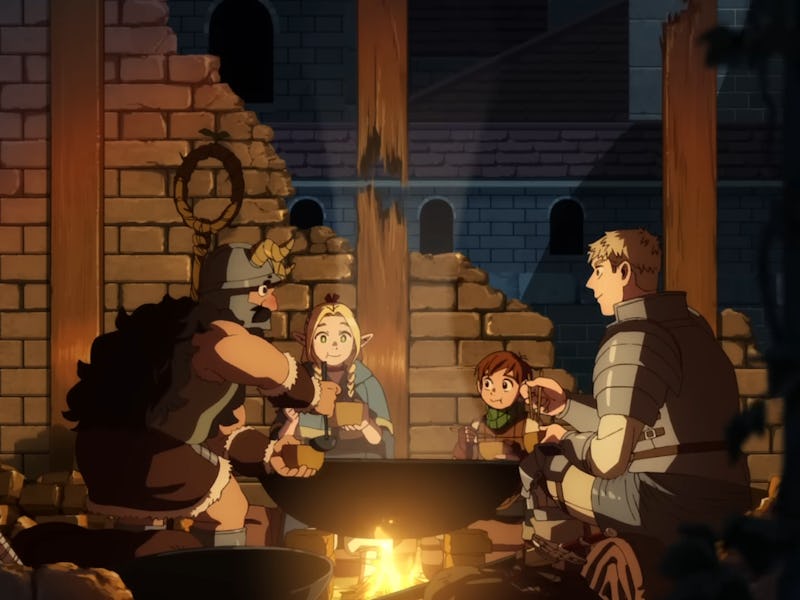How Video Games Set The Table For Delicious In Dungeon
Creator Ryoko Kui put in a lot of gamer hours to make Netflix’s fantasy cooking anime a smash hit.

Delicious in Dungeon, Netflix’s new smash-hit anime series, has been delivering a bountiful feast for longtime manga readers and newfound watchers alike. While the series continues an uptick in invigorating fantasy shows with innovative stories in the anime industry, its manga, created by Ryōko Kui, owes a lot of its inspiration to fantasy video games.
Although Kui now considers herself a gamer, she didn’t fully indulge in the hobby until Delicious in Dungeon’s manga was serialized in 2014. Like a modern-day anthropologist, Kui pored over a myriad of games for research purposes to flesh out her fantasy series beyond the scope of her formative experiences with pop culture touchstones like The Lord of the Rings and The NeverEnding Story.
Gotta pay the troll toll.
In a February interview with Famitsu, Kui revealed that the core concept of Delicious in Dungeon was directly inspired by Wizardry 6: Bane of the Cosmic Forge. This becomes painfully obvious when you consider the game, much like her magnum opus, follows a party of six adventurers — a human, elf, dwarf, fairy, and a dog race called Rawulves — as they venture into a treacherous dungeon rife with monsters. Except, Kui’s party swaps out Rawulves and fairies for a cute yet ferocious cat and a sardonic half-foot.
Speaking with Famitsu, Kui recounted Wizardry as a bit of a boring game to watch her dad play. However, the 1990 Famicom-era title’s monster designs mesmerized her. This is probably why the show’s protagonist, Laios Touden, has such a hyper-fixation with their monster (meals) of the week. Manga artists (or Mangaka) sometimes make a habit of modeling their protagonists after themselves, after all.
Wizardry wasn’t the only old-school video game that inspired Kui to make Delicious in Dungeon. Additional ingredients for Delicious and Dungeons' gumbo of fantastical notes involved Kui researching Dungeons and Dragons rulebooks, playing Legend of Grimrock, and trying her damndest to procure a copy of Dungeon Master, a 1987 Atari game renowned for its challenging food mechanic.
To further illustrate the length she went to immerse herself into the capital G gamer lifestyle, Kui’s personal hobby blog — which feels like thumbing through the pages of a video game guidebook — houses a diary-esque scrapbook of doodles dating back to 2014. Chief among Kui’s illustrations are fan art for Bahamut Lagoon, the Pathfinder series, Planescape: Torment, Baldur’s Gate 1 and 2, as well as her early access playtime with Baldur’s Gate 3.
Delicious in Dungeon’s portrayal of the physical and sociopolitical differences between short and long-lived fantasy races keenly harkens back to the palpable series-spanning drama in Baldur’s Gate. Kui even dips into video game fanfiction by having her characters swap races and classes after mistakenly interacting with changeling mushrooms.
Character over action
As fans may have gleaned from Delicious in Dungeon’s hearty emphasis on character-driven drama engrossed in a lore-rich setting, Kui isn’t a big fan of action games. In fact, as many fantasy-afflicted gamers can relate, Kui initially found it hard to enjoy playing games outside of turn-based RPGs. But despite this aversion, Kui has also expressed interest in titles like The Legend of Zelda: Breath of the Wild, Tears of the Kingdom, Red Dead Redemption 2, The Witcher 3, Cyberpunk 2077, and Disco Elysium — all lauded for riveting character-driven stories and incredible attention to detail, along with their action-focused gameplay.
Chrono Cross composer Ysunori Mitsuda also composed Delicious in Dungeon’s soundtrack.
Kui’s exhaustive study of video games not only yielded a cornucopia of hallmarks of the medium, it also informed an under-appreciated facet of the Netflix series: its music. When it came time to find a composer for the anime adaptation, Kui hand-picked the famed video game maestro Yasunori Mitsuda. According to Automaton Media, Kui’s formative experience listening to Chrono Cross’ opening sequence on repeat played a huge part in her decision.
Although Kui’s video game journey wasn’t common knowledge prior to her Famitsu interview, Delicious in Dungeon's video game-influences aren’t lost on its ever-growing fandom. In fact, since the show began airing, social media sites like X (formerly Twitter), Tumblr, and Reddit have experienced an influx of Delicious in Dungeon fan art reimagining its characters as a proper pixel-art RPG. Hopefully, gaming and anime fans alike will one day have their newfound hunger for Delicious in Dungeon satiated in the form of its own video game.
Delicious in Dungeon is streaming now on Netflix.